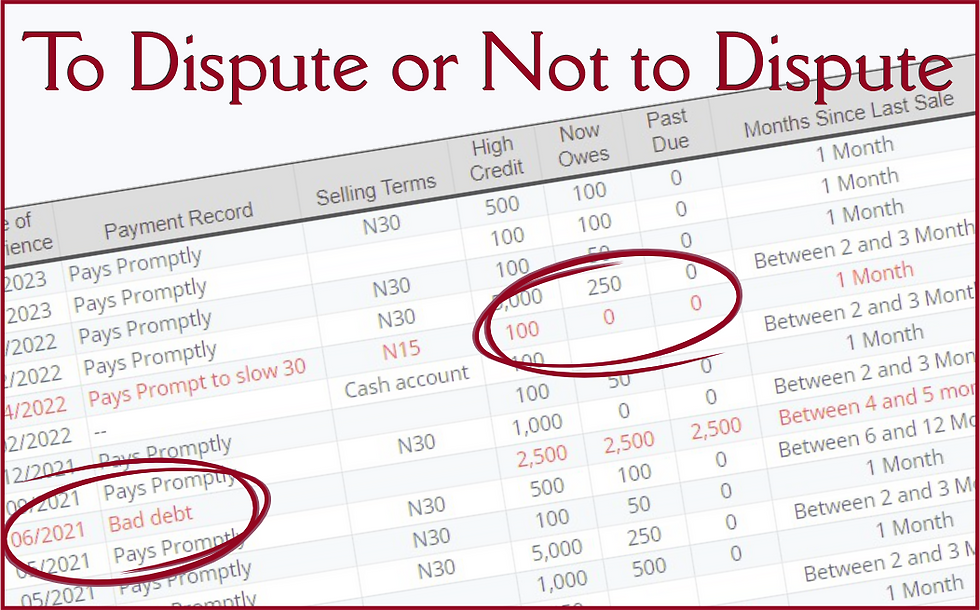Banking on Your Business
- Joy Greenwood
- Jun 23, 2017
- 4 min read
Updated: Feb 3, 2022
If you are still trying to find easy ways to boost your business credibility, this one tip may mean a world of difference. One of the questions I get asked most is what affect your business bank account has on your ability to achieve corporate credit. Most people think that as long as they're making purchases in the business name, they should be okay, right? But that's not necessarily so. The key to getting positive payment history into your business credit file is understanding how your banking practices play into the process.

Lots of small business owners (especially those just starting out) will make purchases in the business name, but then pay for those purchases using a personal credit or debit card. In effect, what their saying is "I'm paying for this, but it's really for my business". Unfortunately, just by attaching your personal payment method on the file, they have just converted a business transaction into a personal one. And, by rule, if it's personal, it can't be contributing to the business's credibility. Over the years, any number of businesses have sued Dun & Bradstreet because of issues pertaining to the payment history in their file. Some have even taken it as far as the Supreme Court. But the reason D&B always wins these cases is not because of a team of high priced lawyers, but rather because D&B is firm in their commitment that no consumer transactions will make it into the commercial credit report. Most of the lawsuits against D&B revolve around their refusal to identify the specific business or financial entity reporting derogatory payment history in a business's credit file. And the Fair Credit Reporting Act, acting as a watchdog in these cases, cannot force D&B to release the reporter's name because that law only regulates consumer credit and has no jurisdiction pertaining to commercial credit. The only time D&B can cross the line between the two is if the business is a sole proprietorship, in which case the owner's personal credit will always be attached to any transaction made in the business name. Even in these instances, though, D&B can stand firm in their proprietary stance if the transaction was made in the business name. So what does this mean to your business? It means that you have "bank" on your business to get the most "bang" for your business. Here are a few tips and techniques to make sure you get on track:
Take out the debit or credit card you use when making purchases and check the imprint on the front of the card. It should have your business name listed, even if it also has your personal name. If the business name is not shown on the card and the monthly statements, then it is not considered a business payment method.
Using your business debit card to make point of sale transactions does nothing for your credit file. However, if you use a business credit card, those transactions will be included in your monthly statement from your credit card provider, and most of those providers report automatically to D&B on all their business customers.
Your business credit card statement mentioned above needs to be paid using a business bank account for it to qualify to be reported to the bureaus as a commercial transaction. Most credit card providers report to all the commercial bureaus, so it will benefit those credit files, as well.
Is your bank account being auto-drafted on a monthly basis for some of your recurring payments? These transactions stand a better chance of getting included into your credit file if they are in the business name and being paid from a business bank account.
The business name and address on your bank account and credit cards needs to match exactly to what is reflecting in the business credit report. This data is a lot like a puzzle piece. If it is not an exact match, it often will get discarded or associated to a different business credit file.
Do you need to make a point of sale purchase today? Set up an online account with your supplier so you can make the purchase online and pick it up in the store. This links your business transaction to your business account, and that transaction now qualifies to be reported to the bureaus.
Don't shy away from commercial credit or contractor accounts simply because you are asked to provide a personal guaranty or a temporary security deposit. Oftentimes, these types of accounts help to get your foot in the door and build stronger credibility, but be sure the deposit is paid using a business check or credit card.
Remember: When applying for working capital loans and business lines of credit, lenders are going to look at your bank statements to verify income is fluid and expenses are a factor in your profitability. When your banking on your business, every transaction is another building block to your future success.
If you would like to discuss how banking on your business can help boost your business into a whole new world of credibility, CLICK HERE to book a free one-on-one consultation, or just give me a call at 800-918-7505 (ext 2 reaches me directly).




Comments